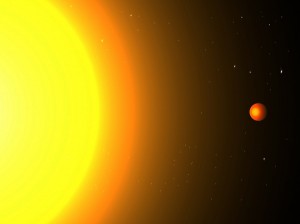700 light years from us is an Earth size planet where almost three years pass in the time it takes for Earth to rotate on its own axis. Welcome to Kepler 78b!

We just learnt of its existence this year when a team of astronomers at Massachusetts Institute of Technology (MIT) detected the exoplanet when studying the data collected by the Kepler Space Telescope in its observation of more than 150,000 stars in a section of the galaxy to look for Earth size planets.
They named the new exoplanet Kepler 78b and the discovery was published in the Astrophysical Journal.
Kepler 78b Has One of the Shortest Orbital Periods
When they made the discovery, the team was focused on finding Earth size planets that have extremely short orbital periods. They found one of the shortest orbital periods ever discovered.
The new exoplanet orbits its star in 8.5 hours. That is how short a year is there.
The fact that it is extremely close to its parent star means that it only has a little distance to cover in its orbit.
In fact, it is 40 times closer to its star than Mercury is to the sun.
Its star rotates at a speed more than twice that of the sun indicating that it is probably a relatively young star that has not had much time to slow down.
Kepler 78b is a small fireball of a planet
It is so near its star that its surface temperatures is likely to be as high as a scorching 3000 degrees Kelvin. Its surface is covered by a massive ocean of lava.
Scientists are planning to study the gravitational effect it has on its star given its close proximity and use the results to estimate its mass.
Kepler 78b is an Earth Size Exoplanet
The new exoplanet is the size of Earth. To determine its size, astronomers measured the light emitted by the planet and determined the amount by which the overall light dimmed when the planet passed behind the star.
This discovery marks the first time that astronomers managed to detect the light given off by a planet that small. The light is emitted by radiation from its heated surface and the light reflected by the lava and atmospheric vapor on its surface. By studying the light using advanced telescopes, we could learn more about the planet’s composition, surface and reflective properties.
Is Kepler 78b A Habitable Exoplanet?
Given its close proximity to its star and the scorching temperature, Kepler 78b is most likely not habitable.
Living there would be like living on a volcano. Its surface is covered by molten lava.
